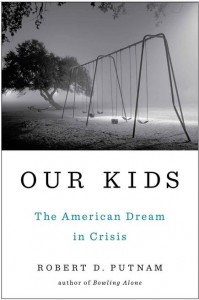 Robert Putnam, the Harvard sociologist who wrote “Bowling Alone” and popularized the concept of “social capital,” has written another book that will surely shape the public conversation: “Our Kids: The American Dream in Crisis.” To quote from Bradford Wilcox’s review in the Wall Street Journal:
Robert Putnam, the Harvard sociologist who wrote “Bowling Alone” and popularized the concept of “social capital,” has written another book that will surely shape the public conversation: “Our Kids: The American Dream in Crisis.” To quote from Bradford Wilcox’s review in the Wall Street Journal:
For the well-educated, the phrase “our kids” may well bring to mind conditions of relative affluence, in which children grow up in a family with two married and attentive (even overattentive) parents; attend high-performing schools; and feel themselves embedded in a network of friends and mentors ready to help them navigate life’s challenges. By contrast, “their kids” — the kids of poor and working class parents — face a world in which social capital is in short supply. As Mr. Putman shows powerfully and poignantly– combining reporting with empirical analysis — the disparity results in too many children in nonaffluent circumstances feeling alone, emotionally stunted and unable to summon the will to climb today’s economic ladder into the middle or upper class. …
We learn that the percentage of children living in single-parent homes has been falling in college-educated circles since the mid-1990s even as it has been rising in homes headed by parents with a high-school diploma or less. Mr. Putnam reports that, by the time they start kindergarten, children from professional families hear 19 million more words than children from working-class families. Even the religious gap between the rich and the poor — traditionally rather narrow — is widening. These days, Mr. Putnam laments, “poor families are generally less involved in religious communities than affluent families,” which is unfortunate, he notes, given that churchgoing is associated with better performance in school, less drinking and drug use, and less delinquency. The class divide in institutional access translate into dramatically different chances that children will flourish later in life.
There aren’t many beliefs that liberals and conservatives share, but one of them is the belief that America should be a place where every child has an opportunity to better his or her life. What divides us is how best to achieve that objective. What Putnam’s book apparently does — and I’ll report back when I read it — is emphasize how cultural traits reinforce the impact of economic disparities. Affluent families don’t just have more money, they have more intact family structures, they provide a cognitively richer environment and they have stronger support networks. In a word, they have greater social capital.
That insight illuminates the debate over the nature of inequality in the United States but hardly settles what to do about it. Conservatives still can argue that we need to focus on creating intact family structures. Liberals still can argue that we need to double down on spending for pre-K education. But as I have argued repeatedly on this blog, we need to understand the nature of poverty before we can hope to fashion “solutions” to it. I’m hopeful that “Our Kids” will clarify the challenges we face.
— JAB


